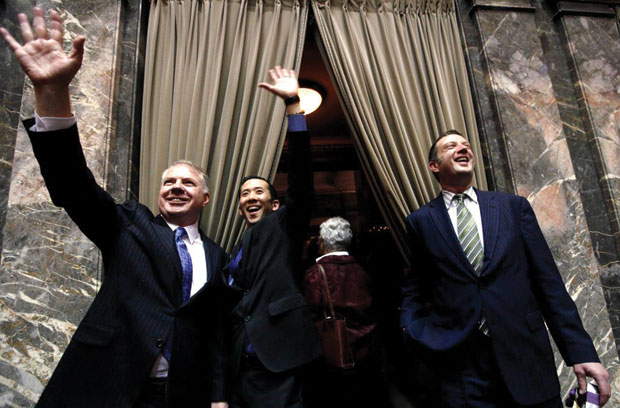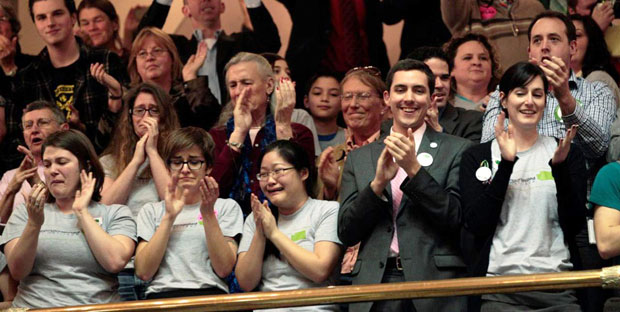House vote expected as early as next week, but referendum looms

WAVES OF JOY | Openly gay Sen. Ed Murray, D-Seattle, from left, and his partner Michael Shiosaka wave at spectators in the upper gallery after the Senate voted for a proposal to legalize same-sex marriage Wednesday evening, Feb. 1 in Olympia, Wash. (Associated Press)
LISA KEEN | Keen News Service
Washington State is well-poised to become the seventh state — and the second-largest — where same-sex marriage is legal.
The Washington State bill for marriage equality cleared a crucial hurdle Wednesday night, Feb. 1, passing the state Senate on a vote of 28-21 after senators first shot down an attempt to put the issue on the ballot in November — even though a public vote is still likely through a referendum. Four Republicans in the Senate voted in favor of the marriage equality bill, while three Democrats voted against it.
The bill now goes to the full House, where headcounts gives it a clear margin for victory. Washington United for Marriage, a coalition of groups working for passage of the legislation, said the vote in the House could come as early as next week.
“The overwhelming support we’re seeing from businesses, labor, faith communities and people all across the state is a testament to the momentum of this movement and sensibilities of Washingtonians,” Lacey All, chair of Washington United for Marriage, said in a statement shortly after Wednesday’s vote. “Volunteers from every part of the state have contributed thousands of hours of their time to make today possible, and we thank them for their commitment to this issue.”
The Senate dealt quickly Wednesday night with 11 amendments, most dealing with proposed religious exemptions. It adopted seven of the amendments but, on a 26-23 vote, rejected an attempt to put the issue before voters in November.
Sen. Brian Hatfield, D-Olympia, who proposed the referendum, announced before the debate that he would vote in favor of the marriage equality bill. But during debate, he warned his colleagues that groups opposed to same-sex marriage are already preparing to gather signatures to force a referendum on the measure this November. Such opponents will likely have until early June to collect more than 120,000 signatures.
Sen. Edward Murray, an openly gay Democrat from Seattle and a 15-year veteran of the Legislature, sponsored the bill. It calls for “ending discrimination in marriage based on gender and sexual orientation to ensure that all persons in this state may enjoy the freedom to marry on equal terms, while also respecting the religious freedom of clergy and religious institutions to determine for whom to perform marriage ceremonies and to determine which marriages to recognize for religious purposes.”

CHEERS AND TEARS | Members of the gallery look down and applaud as the Senate passes the bill. (Associated Press)
Murray said on the floor prior to the vote that those who voted against the bill, “are not, nor should they be accused of bigotry.”
“Those of us who support this legislation are not, and we should not be accused of, undermining family life or religious freedom,” Murray added. “Marriage is how society says you are a family.”
Murray said he and his partner of more than 20 years — Michael Shiosaki — plan to marry and added that “regardless of how you vote on this bill, an invitation will be in the mail” to their wedding.
The religious protection language in the bill stipulates that “no official of a religious denomination or non-profit institution … may be required to solemnize any marriage in violation of his or her right to free exercise of religion guaranteed by the First Amendment to the United States Constitution or by the Washington state Constitution.” It also enables religious institutions to bar use of their facilities to same-sex couples for marriage ceremonies.
Many of the amendments approved Wednesday night sought to add to the religious exemptions. One particularly ominous amendment sought to add that no state or local government can “base a decision” to do business with “any religious organization” based on the organization’s refusal to accommodate same-sex marriage ceremonies. That amendment failed.
The Senate also rejected, by 27-22, an attempt to enable individual judges, justices and commissioners to refuse to solemnize a same-sex ceremony due to their personal religious beliefs. And it rejected an amendment seeking to allow individuals and businesses — including wedding planners, photographers and florists — to refuse to provide services and accommodations for same-sex ceremonies.
Washington Gov. Chris Gregoire, a Democrat and longtime supporter of rights for same-sex couples but not always a strong supporter of marriage equality, announced Jan. 4 that she would support the bill. Local news media reported that the governor was in the Senate for the debate and she issued a statement immediately after the vote.
“Tonight the Washington State Senate stood up for what is right and told all families in our state that they are equal and that the state cannot be in the business of discrimination,” said Gregoire. “I believe that this decision should be made by our state Legislature, and I’m proud our elected leaders recognized that responsibility.”
Gregoire thanked Murray for his leadership on the bill.
Murray has been a key mover behind much of Washington State’s legislation to prohibit discrimination against LGBT people. He led the successful effort in 2006 to pass a statewide non-discrimination law to protect LGBT people and, in 2007, led the fight for passage of a domestic partnership law. In 2009, he sought passage of the state’s “Everything but Marriage” bill.
Lambda Legal National Marriage Project Director Camilla Taylor issued a statement saying same-sex couples in Washington State are now “one step closer to enjoying the freedom to marry, thanks to the impressive efforts of Washington United for Marriage, and the bravery of supporters of equality in the State Senate.”
Washington State, which has 6.8 million residents, would become the second-largest state behind New York where same-sex marriage is legal.
If the bill is signed by Gregoire and opponents are unable to gather the necessary signatures for a referendum, same-sex couples could wed as early as June. However, if the opposition does force a referendum, marriages would have to wait until after the November election.
© 2012 Keen News Service. All rights reserved.
This article appeared in the Dallas Voice print edition February 3, 2012.
















Gosh, how dreadful that the people of Washington might actually have a say in the way marriage is defined in the state. No! Absolutley not! They might vote it down and where would we be? We would have to live under the same definintion of marriage that mankind has lived under since humans first appeard on the earth. Pure democracy (spelled “referendum”) is not the friend of the social engineers so they can’t allow that.
Not mentioned in the photo caption above: Pictured on right is King County Councilmember Joe McDermott, also openly gay who plans to marry his same-sex partner. Seattle is part of King County.
Good! I’m proud to be a Washingtonian. Here’s hoping the hateful anti-equality bigots in this state aren’t able to put this on the ballot, and everyone is able to marry this summer. Equal rights should not be put to a vote. “But everyone should have a say!” people whine. Ha. Tyranny of the majority is never a good thing! Were their rights and marriage voted on?